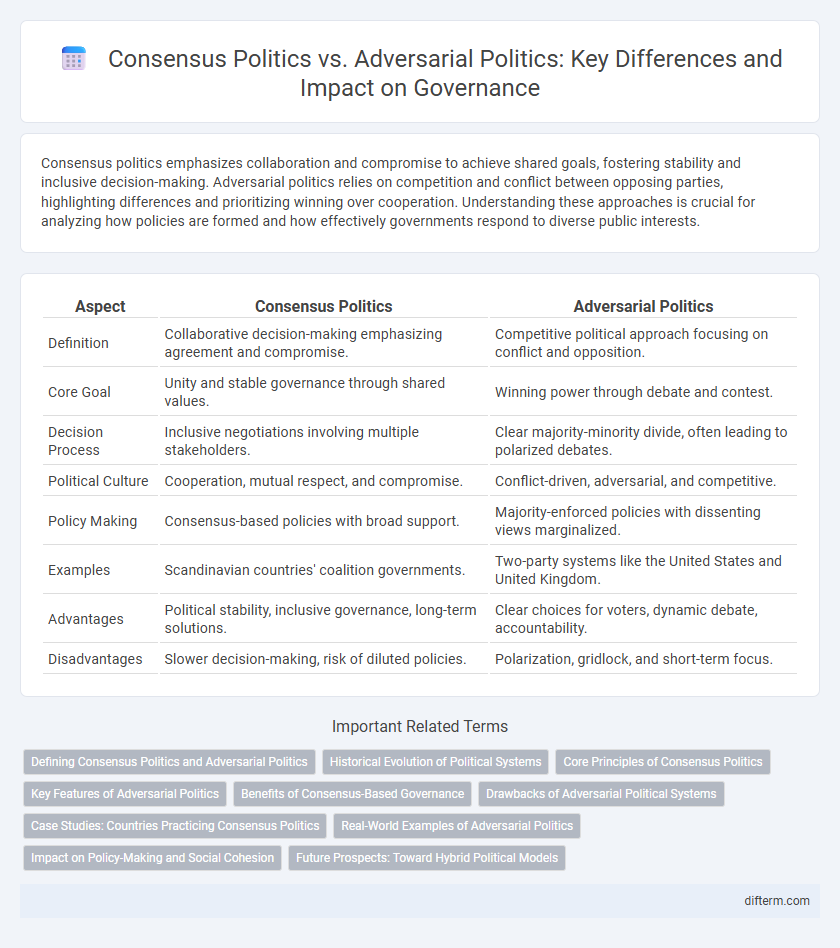Consensus politics emphasizes collaboration and compromise to achieve shared goals, fostering stability and inclusive decision-making. Adversarial politics relies on competition and conflict between opposing parties, highlighting differences and prioritizing winning over cooperation. Understanding these approaches is crucial for analyzing how policies are formed and how effectively governments respond to diverse public interests.
Table of Comparison
| Aspect | Consensus Politics | Adversarial Politics |
|---|---|---|
| Definition | Collaborative decision-making emphasizing agreement and compromise. | Competitive political approach focusing on conflict and opposition. |
| Core Goal | Unity and stable governance through shared values. | Winning power through debate and contest. |
| Decision Process | Inclusive negotiations involving multiple stakeholders. | Clear majority-minority divide, often leading to polarized debates. |
| Political Culture | Cooperation, mutual respect, and compromise. | Conflict-driven, adversarial, and competitive. |
| Policy Making | Consensus-based policies with broad support. | Majority-enforced policies with dissenting views marginalized. |
| Examples | Scandinavian countries' coalition governments. | Two-party systems like the United States and United Kingdom. |
| Advantages | Political stability, inclusive governance, long-term solutions. | Clear choices for voters, dynamic debate, accountability. |
| Disadvantages | Slower decision-making, risk of diluted policies. | Polarization, gridlock, and short-term focus. |
Defining Consensus Politics and Adversarial Politics
Consensus politics emphasizes collaboration and compromise among diverse political groups to achieve widely accepted policies, prioritizing social stability and gradual reform. Adversarial politics, in contrast, centers on competition and conflict between opposing parties, often highlighting ideological differences to mobilize support and drive decisive change. Understanding these models clarifies how political systems balance cooperation with confrontational debate to shape governance outcomes.
Historical Evolution of Political Systems
The historical evolution of political systems reveals a gradual shift from adversarial politics, characterized by rigid party competition and conflict, towards consensus politics emphasizing cooperation and power-sharing among diverse groups. Early models in many democracies prioritized adversarial frameworks to solidify political identity and accountability, while contemporary governance increasingly integrates consensus-oriented mechanisms to address complex societal challenges and promote stability. Key examples include the transition in post-war Western Europe where consensus democracy emerged as a way to rebuild and unify societies fractured by conflict.
Core Principles of Consensus Politics
Consensus politics prioritizes inclusivity, cooperation, and compromise among diverse political actors to achieve broadly accepted policies. It emphasizes stakeholder engagement, shared values, and long-term stability, aiming to minimize conflict and foster social cohesion. Core principles include mutual respect, dialogue, and the pursuit of common ground over partisan rivalry.
Key Features of Adversarial Politics
Adversarial politics is characterized by sharp ideological divisions, where opposing parties engage in intense competition to dominate policymaking and public opinion. This approach often leads to polarized debate, strategic conflicts, and a focus on winning rather than compromise. Key features include partisan rivalry, confrontational discourse, and an emphasis on party loyalty over consensus-building.
Benefits of Consensus-Based Governance
Consensus-based governance promotes inclusive decision-making by incorporating diverse perspectives, leading to policies with broader support and increased legitimacy. This collaborative approach reduces political polarization and fosters social cohesion, enhancing long-term stability and trust in institutions. Evidence from countries practicing consensus politics shows improved policy effectiveness and more resilient democratic systems.
Drawbacks of Adversarial Political Systems
Adversarial political systems often lead to heightened polarization, causing legislative gridlock that hampers effective governance and delays critical policy implementation. Such systems may foster hostility and undermine public trust by prioritizing party loyalty over collaboration, exacerbating social divisions. This environment can reduce the quality of democratic deliberation, limiting constructive dialogue and mutual understanding between opposing factions.
Case Studies: Countries Practicing Consensus Politics
Countries practicing consensus politics, such as Switzerland and the Netherlands, emphasize power-sharing, coalition governments, and inclusive decision-making to ensure broad representation. The Swiss Federal Council operates as a collective executive, integrating multiple parties across linguistic and cultural divides to maintain stability and social cohesion. Similarly, the Dutch political system's proportional representation fosters diverse coalitions that prioritize compromise and reflect a wide spectrum of voter preferences, mitigating the polarization common in adversarial politics.
Real-World Examples of Adversarial Politics
Adversarial politics manifests prominently in the United States, where the two-party system fosters intense competition and polarization between Democrats and Republicans, exemplified by frequent government shutdowns and legislative gridlocks. In the United Kingdom, Brexit debates showcased adversarial dynamics, with Brexit-supporting Conservatives clashing sharply with opposition Labour members, disrupting consensus-building. Similarly, India's political landscape often features adversarial confrontations between the Bharatiya Janata Party (BJP) and opposition parties, leading to fierce electoral battles and policy standoffs in parliament.
Impact on Policy-Making and Social Cohesion
Consensus politics fosters collaborative policy-making, leading to more stable and broadly accepted decisions that enhance social cohesion by incorporating diverse viewpoints. Adversarial politics, characterized by intense party competition, often results in polarized policy outcomes and social fragmentation, as opposing groups prioritize winning over compromise. The contrasting approaches significantly shape governance efficacy, with consensus models promoting inclusivity and adversarial models amplifying division.
Future Prospects: Toward Hybrid Political Models
Future prospects in political systems point toward hybrid models blending consensus politics and adversarial politics to enhance governance efficacy. Combining cooperative decision-making structures typical of consensus politics with the competitive elements found in adversarial politics could foster increased political stability and inclusivity. These hybrid models aim to balance diverse interests, reduce polarization, and improve policy outcomes by integrating collaboration with constructive debate.
consensus politics vs adversarial politics Infographic

 difterm.com
difterm.com